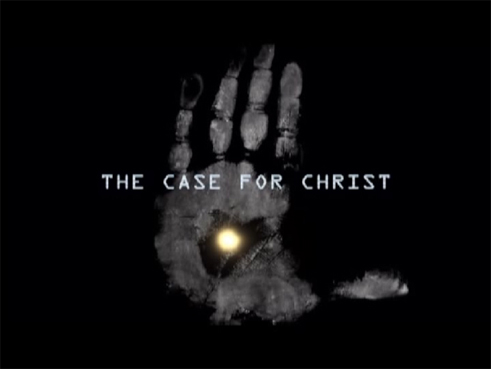
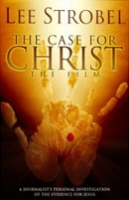 BUY IT AT AMAZON: CLICK HERE!
BUY IT AT AMAZON: CLICK HERE!
STUDIO: Lionsgate
MSRP: $19.99
RATED: Not Rated
RUNNING TIME: 71 Minutes
SPECIAL FEATURES:
• None
The Pitch
Yoo-Hoo! Science? It’s me, your old arch-enemy, religion! I know we’ve had our disagreements in the past, but maybe we can just let bygones be bygones and call it a truce. C’mere and give me a hug. That’s right. Come closer. Don’t shy away. I’m not going to hurt you-
::SUCKER PUNCH TO THE CROTCH::
HOOOO, BOY! THAT’S RIGHT, STAY DOWN! HOW YOU LIKE ME NOW, SCIENCE? I JUST BURDEN OF PROOFED YOUR NUTS!
The Humans
Jesus of
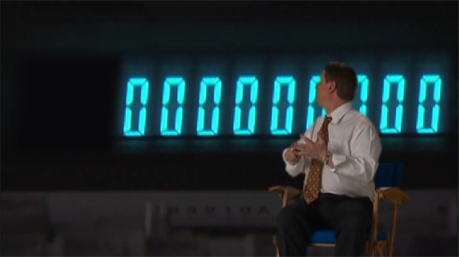
The big-screen convertometer worked in "real time" to tell Lee Strobel how many agnostic converts THE CASE had won over. The results weren’t as satisfying as he had hoped.
The Nutshell
Lee Strobel, former Legal editor for the

MegaJesus’ nose hairs had to be trimmed with garden shears.
The Lowdown
I’m glad for Lee Strobel. I really am.
According to what I’ve read and what I’ve just seen, Lee was an atheist until the early nineties, when he undertook a spiritual journey that led him to the conclusion that Jesus Christ is the son of God. Apparently, this saved his marriage. Good for him. Unfortunately for the rest of the universe, he decided to package his spiritual journey into a series of books and other media, Including The Case For Christ, The Case For Faith, The Challenge of the Cults and New Religion, and (gulp!) The Case for a Creator. I’m not familiar with any of these, and I don’t plan on reading any of them, although I might make an exception for the Creator one- It’s always fascinating to hear a creationist come up with new Rube-Goldberg-y ways to explain the universe. In case it isn’t obvious by now, I’m not at all aligned with Lee Strobel’s conservative, literalist spiritual outlook. This is the kind of religious outlook that unites like minded families while dividing them from the rest of the world. It’s the kind of religion that, while enjoying a majority over all faiths in this country, finds a way to make its believers feel oppressed by a secular minority. It’s a counterintuitive, antagonistic approach to faith that lends itself well to dirty politics. In the supporting materials and in the DVD production of The Case for Christ, Strobel references “atheist think tanks”, “critical scholars,” and “

With atheists tagged in a recent survey as the new “least trusted minority” in American society, it’s hard to believe that anyone could sell an “intellectual onslaught” as a valid threat to religion, but here we are.
With Strobel’s background in mind, I figured that there were two ways this film could have been taken: As a honest-to-God (pun intended) scientific inquiry into the validity of the New Testament and Jesus Christ, or as a propaganda piece.
Sadly, this film falls into the latter column. Strobel’s arguments have more holes in them than Sonny Corleone, so if you’re expecting to have your agnostic mind blown by the hidden secrets of the faithful, you’ll be sorely disappointed. It became clearer and clearer to me as I watched this film that it wasn’t geared toward the faithless. It’s a mostly unscientific booster shot for the already faithful to reinforce their beliefs. Surprisingly, it’s good fun to take apart, and watching it might even give you interesting insights into the mind of a religious fundamentalist.
We begin with a recap of Strobel’s background. He was an atheist with a newly born-again wife, and he subsequently challenged himself to determine the truth behind Jesus of Nazareth because he admired his wife’s new and improved attitude. To the average viewer, it’s obvious that the deck’s already stacked waaay in favor of the pro-Jesus side, since it’s revealed that his wife secretly plants bible verses around the house for Lee to find while he’s on this “journey.” JURY TAMPERING, ANYONE? Next, we’re introduced to a group of professors and biblical scholars who are tasked to help Strobel prove Jesus’ divinity. Their first assignment: Prove that the New Testament is based on eyewitness accounts, and is, by proxy, “true.” In other words, if we can prove that the New Testament is “true,” then we can use the New Testament as evidence in The Case. In other other words, proving that the New Testament is “true” is the lynchpin of this entire film’s logic, and if you don’t buy it, well, then, you might as well turn your televisions off right now.
First of all, “based on eyewitness accounts” and “true” are two very, very different things. But let’s put aside the obvious: can Strobel convince us that the Bible is truly an accurate historical document, and not a biased, constantly rewritten and re-imagined religious text engineered by ancient writers to recruit believers? He proposes the following:
1) It’s too bad that the new testament was written several decades after the deaths of Mark, John, Matt, and Luke. However, it’s widely known that Rabbis had to memorize the Torah, and were forbidden to write anything down. Therefore, there clearly were some folks out there with great memories who could have remembered everything that happened during those days.
2) The New Testament stories were passed down by Oral Tradition. Oral Tradition is self correcting, since members of the community with firsthand knowledge would have corrected the storytellers, and those storytellers would have corrected future storytellers, and so forth. Basically, Oral Tradition was more or less an awesome way to preserve data.
3) There are references to Jesus in other historical texts.
4) Descriptions in the New Testament reflect accurate descriptions of early Palestinian life as we know it based on archaeological records.
Ok: Above rests the entire CRUX of Strobel’s argument. If this doesn’t work, nothing else matters, since Strobel repeatedly uses the Bible to back itself up throughout the rest of the film. Is it good enough evidence to allow the Bible to stand up as its own supporter?
Are you shitting me, Strobel?
Number 1 proves nothing. We’ve got some evidence of early priests transcribing ancient biblical texts after they’d been written, but we have no evidence that memory-adept rabbis stored away Christ’s life story and preserved it for later use. It’s completely circumstantial. Numbers 3 and 4 do well to prove that the New Testament was a document that was written thousands of years ago, and that Jesus did, indeed, exist. They do absolutely nothing to prove the truthfulness of the New Testament. One Thousand and One Nights is accurate to AD 900
Number 2, however, is straight-up lunacy. To defend oral history as a good way to accurately preserve historical data, given the shifting moods and needs of storytelling authority figures, is nothing short of absurd. There’s an English bishop in the film who smartly concedes that “It’s obvious that [the bible] has been edited based on the needs of the community.” It’s one of the several contradictions that crops up in the film, and, unfortunately, renders the rest of the film useless, since Strobel uses the gospels to prove Jesus’ divinity from here on in. Which, as you can imagine, is pretty easy.
I guess I could quit now, but I’ll keep going. I get paid by the word, suckers!
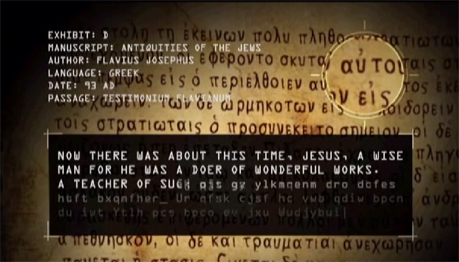
In addition to hunting humans, the Terminator also enjoys reading scripture and attending bible study.
Next, Strobel takes a look at the gospels themselves and addresses some critics’ claims that their numerous contradictions are problematic. As many of us know, many elements of the gospels and their portrayal of Christ’s life are contradictory. John disagrees with the other three about how long Jesus stayed in
Strobel’s next mission: prove that Jesus actually performed all of the miracles attributed to him in the New Testament. He points to ancient critics who called him a ‘magician’, which he claims shows that even Jesus’ critics concede that he could perform "wonderful acts." This actually does go a long way to prove that Jesus was a well-known prophet, but it doesn’t do anything to prove the efficacy of his miracles. Strobel also points out that Jesus was an Exorcist, and that he didn’t need any "potions or incantations" to remove a demon- by simply calling the Demon by name, Jesus could "get that sucker right out of there." At this point, we’re running under the assumption that Demons are real, and that Exorcism is a useful way to deal with them. If you’re not already on that same page, this argument is useless.
Next, there’s a bulky section where Strobel goes on to show how Jesus fulfills Old Testament prophecies throughout the New Testament. It’s like watching Leonard Nimoy talk about the prophecies of Nostradamus- it’s junky, paranormal, ‘In Search Of Bigfoot’ stuff, and really cheapens Strobel’s argument. It’s even more interesting because we know that the writers of the New Testament were aware of these prophecies, and were undoubtedly influenced by them. For example, Strobel talks about a prophecy from Isaiah predicting a messiah that would be "pierced" and martyred. Apologists claim that this ties directly into the crucifixion, and provides good evidence of Jesus’ fulfillment of these prophecies. But it makes one wonder: why would the Romans drive nails into Jesus’ hands? We know from archaeological evidence that the ancient Roman punishment of crucifixion was done with rope, not nails. Why would the Romans make any kind of an exception for Jesus? It makes much more sense that the writers adjusted the event to line up with prophecy, rather than the Romans having made this unusual exception for a rebel leader. Interestingly, nails aren’t even mentioned during the crucifixion passages in the gospels (although ‘nail holes’ are mentioned later).
Finally, Strobel examines the resurrection. It’s the backbone of the Christian faith, so he’d better get this one right. His arguments:
1) The New Testament tells us that Jesus died on the cross, and was carried to the tomb of Joseph of Arimathea. Three days later, a group of women discovered that the tomb was empty. Since women were considered unreliable at the time, the tomb probably really was empty. After all, why would you write a woman into your resurrection story if you really didn’t have to? Also, one of these women was a prostitute.
2) Paul encounters the spirit of Christ, and transforms from Christian-persecutor to missionary. People just don’t ‘change’ like that.
3) There are historical records of early Christians being put to death for their beliefs. Only the belief in a truly resurrected Jesus would have given these martyrs that kind of courage. After all, who commits suicide for their religious beliefs? It’s practically unheard of.
4) Jesus’ critics paid Roman soldiers to tell the community that Jesus’ followers stole his body before the stone was removed from his tomb. The fact that even they admit that the tomb was empty is further proof of a vanishing body. If there ain’t no body for inspectin’, then you gotta believe there was some resurrectin’. (That’s my Johnny Cochran impression)
Again, Strobel piles on the circumstantial stuff. Number 1 spends a lot of time trying to prove that the tomb was empty, but completely misses an even more obvious question: Who says that the tomb had anything in it in the first place? In ancient
Number 2 highlights
Number 3 implies that only true believers and eyewitnesses to the resurrection of Christ would martyr themselves. It’s an unfortunate and untimely comparison, especially given the rise of suicide killings in the
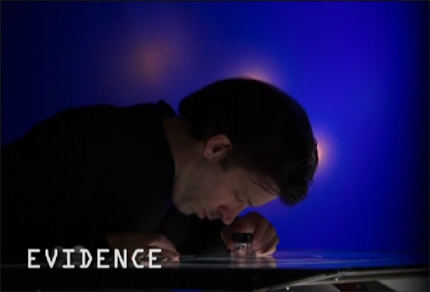
All forensic evidence for The Case For Christ went through Tony and his magical shot glass.
Given that you’re a CHUD reader, it’s unlikely that The Case For Christ will change your mind about anything- it has a flimsy logical foundation and makes wild, reaching assumptions. It’s a biased and entirely one-sided argument. It’s use of "biblevision 2000" (check out the third screencap) to "techno-up" the proceedings is comical, and there’s a great deal of schmaltz with regard to the segments dealing with Strobel’s family, and how his wife desperately wants him to convert to her religion. That’s not saying that Case isn’t worth a watch. I’d even recommend watching it alongside Case‘s polar opposite, The God Who Wasn’t There, an equally biased cross examination of Christianity. Watch Case with a friend, and have fun picking apart Strobel’s reasoning. Discuss whether doubt is an important part of faith, and what the role of empirical evidence should be with regard to faith and religion. If you’re like Strobel and you seek out and require scientific validation for your spiritual beliefs, are you a champion for reason and faith, or are you completely missing the point?
The Package
Scene selections and languages. It’s bare bones. The cover art gives the box a CSI/Discovery channel vibe. Packed inside the box is a promotional slip that reads "CROSS EXAMINATION!!" Get it? Examination? The slip will tell you how atheist, godless conspirators want to turn churches into porno houses and abortion clinics. Seriously, these guys are really, really delusional.
6 out of 10- but not for reasons intended by the filmmakers